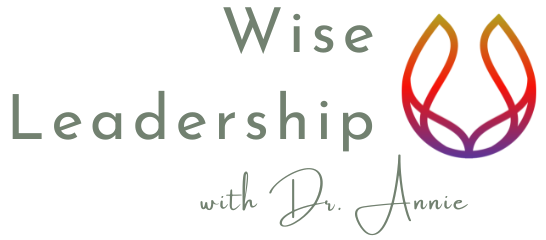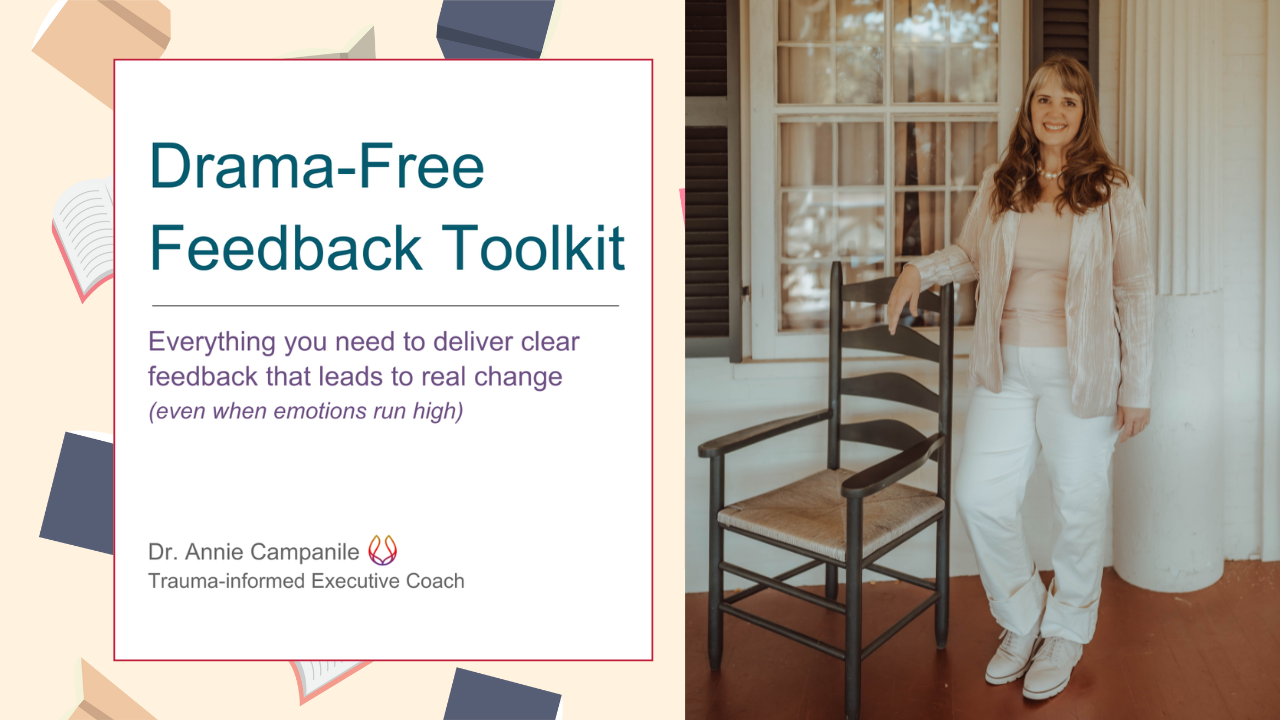How to Quiet Your Inner Critic as a Leader When Praise Isn’t Enough
Aug 06, 2025
Episode 25 | Drama Free Teams | Dr. Annie Campanile
The Surprising Reason Praise Doesn’t Boost Your Confidence as a Leader (and the Simple Shift That Will)
If you’re a caring, high-achieving leader who struggles to feel like you’ve done enough—no matter how much you accomplish—this is for you.
Have you ever finished something big, something you know was a heavy lift, and instead of feeling proud, you feel this low hum of… doubt?
Maybe your boss tells you, “That was incredible,” and your team thanks you for your leadership. But in the back of your mind, there’s still that voice saying, “Sure, but I could’ve done more. I should’ve done more.”
I see it with so many leaders who deeply care about their work. You show up, you overdeliver, you give your all… and yet you never quite feel like it’s enough.
It sneaks in quietly. You might smile and say “thank you” when someone praises you, but inside you’re already running through what you missed, what you could’ve done better, or what still needs fixing.
And here’s why this matters. Over time, that inner tension doesn’t just steal your sense of accomplishment—it affects how you show up in meetings, how you navigate difficult conversations, and even how you build trust and executive presence as a leader.
By the end of this post, you’ll know exactly how to quiet the “I’m not enough” voice in your head with one simple practice you can start today.
Let’s start with a story about “Pamela,” a senior leader I coach who was caught in this exact struggle.
When Success Doesn’t Feel Like Success
“Pamela” had just wrapped up a massive, two-year organizational project. She’d brought departments together, navigated politics, and delivered something with a big, lasting impact.
It was the kind of project that naturally came with plenty of opportunities for drama at work: competing priorities, high visibility, and a lot of pressure to get it right. And she did.
Her boss praised her. Her peers praised her. Even her boss’s boss recognized her work.
But when we sat down for our session, she didn’t look relieved or excited. She looked tired. Her energy was flat. Her eyes weren’t bright with accomplishment.
When I asked how it felt to have completed this milestone, she said quietly, “I’m glad it’s over… but I can’t stop thinking I didn’t do enough.”
She was surrounded by people who were grateful for her work, but she couldn’t take it in because that old voice inside was louder than anything around her.
And if you’ve ever felt that same weight, you know how exhausting it can be. But why does this happen? Let’s look deeper.
Why You Can’t Fully Hear Praise
If this happens to you, you’re not “too hard on yourself,” and you’re definitely not broken.
What’s happening is more simple and more human than that. When you’ve spent years, maybe even decades, telling yourself you have to do more, be more, or prove more, it’s like a groove worn into a record—your brain just keeps playing the same track, even if it no longer fits your life.
In trauma-informed leadership coaching, I see this all the time. It’s not a lack of emotional intelligence in leadership, and it’s not a personality flaw. It’s the nervous system staying on guard long after the actual pressure or risk has passed.
Here’s the thing about beliefs. They’re just thoughts we’ve practiced. So if you’ve got a painful belief, like “I have to be perfect” or “I have to do it all myself,” you don’t have to fight that belief. Instead, you can change it. It’s easier than you might expect.
So when someone says, “You did amazing,” your body doesn’t relax. Instead, it braces. It replays what went wrong or what might’ve been better. It prepares for criticism even when there isn’t any.
But here’s the good news. You don’t have to fight this inner critic. You can meet it gently. And that’s exactly what I showed Pamela how to do.
A Gentle Way to Shift Any Belief
I guided Pamela through a simple exercise that you can try, too.
Grab a piece of paper.
-
On the left side, write the thought you’re carrying that feels heavy. For Pamela, it was:
It’s never enough. I’m never doing enough.
-
Draw a line down the middle.
-
On the right side, ask yourself: If anything was possible, what would I rather believe?
Pamela paused. She took a breath. And finally she said, “I’d rather believe that it is enough. I am doing enough.”
But here’s the key. You don’t have to force a belief your brain can’t accept yet. So instead of jumping straight to “I am doing enough,” you can soften it a little:
“I choose to believe it might be possible that I’m doing enough.”
Feel the difference? You’re not pretending the old thought isn’t there. You’re just giving yourself a tiny opening to consider a new one.
Pamela felt chills. Tears welled up. For the first time in a long time, she felt relief instead of tension.
And here’s the part I really want you to hear. You can feel that same shift too. It doesn’t take hours of work or endless affirmations. It just takes a willingness to practice in a way that feels safe and doable.
Practice Makes It Real
That one moment of relief is powerful, but it won’t erase years of self-criticism overnight.
Think of your old belief like a rubber band. You can stretch it into a new shape, but if you let go too soon, it snaps right back.
So I encouraged Pamela to practice her new thought once a day for a week. Not constantly. Not perfectly. Just once.
When we met again seven days later, she looked different. Her cheeks had color. Her eyes were brighter. And she said, “I still catch myself, but now it’s easier to shift.”
And what surprised her most? Softening her inner critic made it easier to be present and generous with her team. She had more energy to recognize others because she wasn’t stuck in that cycle of proving herself anymore.
And this matters because when you can actually receive praise, it frees up your energy. It builds trust with your team, strengthens your compassionate leadership, and allows you to lead with more clarity and ease.
So what would that kind of shift open up for you?
I’ve Been There Too
I want you to know I’ve done this for myself, too.
During my PhD program, I was juggling 18 credits, a job loss, and my husband’s cancer diagnosis. And I carried this crushing belief that “It’s all up to me. I can’t ask for help.”
So I sat down with a piece of paper.
On the left, I wrote: It’s all up to me.
On the right, I wrote the smallest, softest step I could allow:
“I choose to believe that it might be possible that it might be okay for me to ask for help.”
As soon as I whispered those words, I felt this wave of relief I didn’t even realize I was holding. I cried. A lot.
And with practice, that tiny belief grew. It became easier to accept support. Easier to say yes. Easier to lead without gripping everything so tightly.
This is why I know it’s possible for you, too. Not in some theoretical way, but in a real, lived way.
Try It for Yourself
If you’re stuck in the loop of “I’m not enough”, try this:
-
Name it. Write the belief you’re carrying on the left side of the page.
-
Choose better. On the right, write what you wish you could believe.
-
Soften it. Say, “I choose to believe it might be possible…”
-
Practice daily. Just once a day. Notice how your body responds.
It doesn’t have to be perfect. It just has to be gentle.
And if you’re thinking, “Will this really make a difference?”, try it for a week. I think you’ll be surprised by how much lighter it feels.
Here’s what you’ve learned:
Your beliefs are just practiced thoughts. They can feel so true that you stop questioning them, but with one small, intentional shift, you can start creating a new pattern. One that lets you feel the praise you’ve earned, trust the work you’ve done, and lead with more ease.
Want Help Untangling This for Good?
If you’re ready to finally put down the weight of over-performing and second-guessing yourself, you don’t have to figure it out alone.
In my executive coaching program, I help caring, high-achieving leaders calm the survival brain, build self-trust, and lead without carrying the constant pressure of proving themselves.
If that sounds like the relief you’ve been craving, let’s talk.
👉 Click here to explore executive coaching
Keep Listening
If this resonated, subscribe to Drama Free Teams for more trauma-informed, neuroscience-backed tools to calm internal drama and lead with clarity and connection.
In the next episode, we’re tackling the drama that happens when a peer is promoted into a leadership role and then they’re asked to implement big changes and their colleagues do not like it. How do you support that leader so they don’t feel thrown to the wolves, and how do you support the team so they don’t feel betrayed by their former peer?
Thriving in leadership is possible. And you don't have to do it alone.


